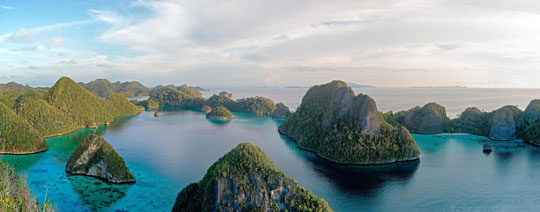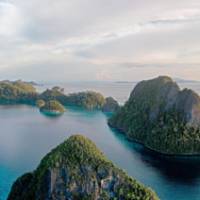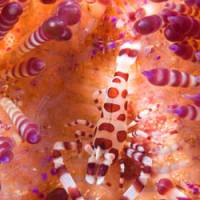In "The Tempest," William Shakespeare writes of a human body deep beneath the waves undergoing "a sea-change into something rich and strange," transmuting into coral and pearls.
The Bard's coinage has come to mean a profound or notable transformation of any sort (now rendered "sea change," without the hyphen), whether it be political, social or environmental.
These days, however, sea change has taken on a more poignant meaning, as our oceans face myriad threats, known and unknown, and as they suffer a silent siege.
Humans are fishing the high seas bare. We are directly and indirectly dumping untold quantities of waste into coastal and deep-water marine ecosystems. With our rising emissions of atmospheric greenhouse gases, we spur climate change that compromises the oceans' ability to absorb carbon dioxide (CO2) and host the plankton that provide much of the oxygen we breath.
Governments, and international and nongovernment organizations (NGOs) are actively funding research, raising awareness, and working to protect the seas — but the critical challenge is that degradation is widespread, increasing and, in some cases, irreversible.
Once boundlessly rich, oceans face steady decline, and in some areas they are already nearly lifeless. Just a quick scan of the media reveals how little we know about them and how often we disagree about what we claim to understand.
Early this month, for example, the Australian and Japanese governments wrangled unsuccessfully in efforts to reach an agreement to balance the interests of whaling and nonwhaling nations. In Japan and abroad, too, controversy continues to swirl in the wake of "The Cove," the Academy Award- winning documentary that lays bare Japan's continuing dolphin slaughter in Taiji, Wakayama Prefecture.
This month in Doha, proponents and critics debated whether to ban the catching of Atlantic and Mediterranean bluefin tuna. Putting short-term economic interests ahead of long-term sustainability, a ban was rejected.
Beyond these living riches, we are also perplexed by the oceans' geophysical characteristics, which remind us how little we know about the waters covering 70 percent of our planet.
For example, oceans absorb and circulate about half of all atmospheric CO2. As levels of CO2 rise steadily, scientists find that acidification from CO2 is disrupting the growth and development of marine plankton, the most basic foundation of the marine food chain (see this column, Aug. 23, 2009). Plankton not only provide food, directly and indirectly, to marine ecosystems and humans across the planet; they also generate more than half of the oxygen we breathe.
Deeper down, scientists are concerned about millions of tons of methane gas bubbling up annually from beneath the ocean floor north of Siberia. Methane is a greenhouse gas that contributes more to atmospheric warming than equivalent amounts of CO2. No one is sure if this phenomenon has been going on for centuries or if it is due to warmer water and air temperatures from climate change. Either way, as the Arctic ice cover shrinks each year, it is likely that subsea permafrost will become increasingly permeable, allowing even more methane to reach the atmosphere.
Yet another concern is that growing expanses of ocean floor are experiencing reduced oxygen levels, and there are now areas nearly void of life. Such areas have been known to exist for years, but they are expanding in the Atlantic, Indian and Pacific oceans. Researchers believe higher levels of CO2, and warmer atmospheric temperatures, affect weather patterns and further lower oxygen levels, killing bottom-dwelling species and forcing fish to change habitat and migration patterns. Unfortunately, certain species that are anathema to fishers, such as jellyfish, thrive in these low-oxygen conditions.
Not surprisingly, the world's major international NGOs are focusing staff and resources on marine issues. One in particular, Conservation International (C.I.), is committing tens of millions of dollars to promoting human well-being through the conservation of marine ecosystems.
Last year C.I., a Virginia-based NGO with offices in Tokyo and across Asia, Africa, Europe and the Americas, began to undertake a unique marine action plan encompassing four approaches to dealing with ocean threats and degradation. They are: a new approach to evaluating the health of our oceans; fisheries reform; regional ocean stewardship; and management of seascapes.
For many years, C.I. has focused on protecting and managing land-based and coastal biodiversity hot spots — regions that are home to unusually diverse varieties of plant and animal species. Now, its new Marine Program will extend C.I.'s work from island and coastal areas to far offshore in an attempt to develop a long-needed, comprehensive approach to ocean conservation. Until now there has been a lack of global consensus on the status of our oceans, as well as fragmented governance — ranging from reasonably good coastal management to near lawlessness on the high seas.
C.I. is particularly concerned that ocean ecosystems face multiple threats that drive an accelerating feedback loop of degradation — a destructive cycle that combines climate change, unsustainable fishing, habitat destruction, invasive species, and pollution, to name a few.
"Our oceans are critical to the health of our planet, and in turn to the well-being of all human beings. They are the primary life-support system for both, providing a stable climate, oxygen, and food for one in four of the people who inhabit Earth," said Greg Stone, C.I. senior vice president, chief scientist for oceans and director of its Marine Program, by e-mail from the Galapagos Islands.
"If we are going to preserve our planet and the marine systems that we depend on, comprehensive action is essential.
"First we need a globally accepted benchmark of ocean health that inspires government, corporate and civil society actions, and measures the effectiveness of marine conservation efforts. Second, we need solutions that influence fisheries policy and markets to reverse deteriorating ocean health worldwide. Third, we need to pioneer new models, such as regional ocean stewardship and Seascapes [large marine areas], for managing and recovering ocean health at scale. Finally, we need to invest adequate resources to launch these global solutions."
Stone led the creation of the world's largest marine protected area, around the equatorial Phoenix Islands of Kiribati in the South Pacific, and was named a 2007 National Geographic Society Hero for this achievement. His book on the Antarctic, "Ice Island," won the 2003 National Outdoor Book Award for Nature and the Environment, and he is a specialist in undersea technology and exploration, using deep-sea submersibles, and undersea habitats. While living in Japan in the 1990s, Stone established a cooperative deep-sea research program between Japan and the United States, and he is a scuba instructor and research diver with over 5,000 dives.
"Prioritizing regional ocean stewardship and management of seascapes can ensure that nations cooperate to remediate and sustainably conserve large expanses of our seas. Our program is based on conserving the oceans for the ecological services they provide, those that are essential for promoting human well-being worldwide," he said.
What he didn't say but he surely knows better than most anyone is that if we fail to conserve our oceans today, we have little chance of providing for the billions of humans who inhabit our planet now and will in generations to come.
Stephen Hesse is a professor in the law faculty of Chuo University and director of the Chuo International Center. He can be reached at [email protected] For more information about Conservation International, visit www.conservation.org/ and www.conservation.or.jp/






















With your current subscription plan you can comment on stories. However, before writing your first comment, please create a display name in the Profile section of your subscriber account page.